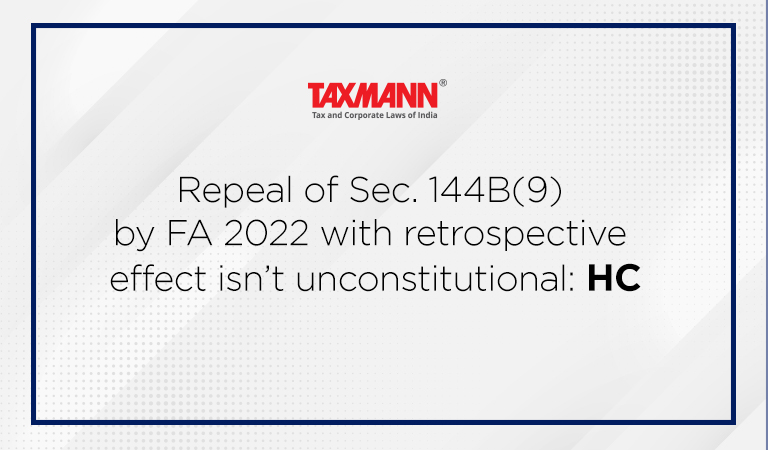Repeal of Sec. 144B(9) by FA 2022 with retrospective effect isn’t unconstitutional: HC
- Blog|News|Income Tax|
- 2 Min Read
- By Taxmann
- |
- Last Updated on 26 December, 2022

Case Details: Sapna Flour Mills Ltd. v. Union of India - [2022] 145 taxmann.com 557 (Allahabad)
Judiciary and Counsel Details
-
- Mrs Sunita Agarwal & Vipin Chandra Dixit, JJ.
- Abhinav Mehrotra & Satya Vrata Mehrotra for the Petitioner.
- A.S.G.I., Gaurav Mahajan & Naveen Chandra for the Respondent.
Facts of the Case
Assessee-company was engaged in the business of running a Flour mill, manufacturing Flour from Wheat. The assessee filed a writ petition before the Allahabad High Court on the grounds that the omission of sub-section (9) of Section 144B of the Income Tax Act was unconstitutional, being ultra-vires to the Constitution.
Sub-section (9) of section 144B provided that the assessment proceedings would be invalid if the specified procedure of faceless assessment was not followed. The Finance Act, 2022 had omitted the provisions of sub-section (9) of Section 144B with retrospective effect, i.e. from 1.4.2021, i.e. from the date of its inception.
It was argued that the omission of Section 144B(9) makes the entire Section 144B unconstitutional, since, the omission of the check/safeguard would result in an arbitrary, whimsical, capricious decision-making process.
High Court Held
The High Court held that sub-section (9) of Section 144B was omitted to streamline the faceless assessment process and address legal and procedural issues that arose during the implementation of this section, which was introduced in 2020.
The amendments made by the Finance Act of 2022, which are the subject of this challenge, are procedural in nature and are intended to simplify the process and resolve any issues that have arisen.
The omission of sub-section (9) of Section 144B was with various new measures for checks and balances having been provided in the procedure prescribed under Section 144B.
For instance, under the pre-amendment version of Section 144B, an assessee could request a personal hearing and this request would only be granted if the Chief Commissioner or Director General believed the request met certain criteria. However, the amendments made by the Finance Act of 2022 to Section 144B have changed this process and personal hearing is allowed without any approval.
Sub-section (9) of Section 144B, which is a procedural statute, did not give the taxpayer any rights, including substantive rights. It only outlined a procedure for conducting an assessment and stated that if the assessment was not conducted in accordance with this procedure, it would be considered invalid.
The purpose of sub-section (9) of section 144B was to place a burden on the department rather than granting rights to the taxpayer. The inclusion of this subsection has caused numerous technical legal disputes due to difficulties in implementing the faceless assessment process, as noted in the amendment bill.
Thus, the challenge to the amendment brought by the Finance Act, 2022 in the omission of sub-section (9) of Section 144B cannot be sustained.
Disclaimer: The content/information published on the website is only for general information of the user and shall not be construed as legal advice. While the Taxmann has exercised reasonable efforts to ensure the veracity of information/content published, Taxmann shall be under no liability in any manner whatsoever for incorrect information, if any.

Taxmann Publications has a dedicated in-house Research & Editorial Team. This team consists of a team of Chartered Accountants, Company Secretaries, and Lawyers. This team works under the guidance and supervision of editor-in-chief Mr Rakesh Bhargava.
The Research and Editorial Team is responsible for developing reliable and accurate content for the readers. The team follows the six-sigma approach to achieve the benchmark of zero error in its publications and research platforms. The team ensures that the following publication guidelines are thoroughly followed while developing the content:
- The statutory material is obtained only from the authorized and reliable sources
- All the latest developments in the judicial and legislative fields are covered
- Prepare the analytical write-ups on current, controversial, and important issues to help the readers to understand the concept and its implications
- Every content published by Taxmann is complete, accurate and lucid
- All evidence-based statements are supported with proper reference to Section, Circular No., Notification No. or citations
- The golden rules of grammar, style and consistency are thoroughly followed
- Font and size that’s easy to read and remain consistent across all imprint and digital publications are applied



 CA | CS | CMA
CA | CS | CMA
